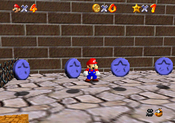Blue Coin: Difference between revisions
(They all count as the Plaza's coins) |
m (→See also) |
||
| Line 38: | Line 38: | ||
*[[Red Coin]] | *[[Red Coin]] | ||
*[[Star Coin]] | *[[Star Coin]] | ||
{{Coins}} | |||
{{SM64}} | {{SM64}} | ||
{{Super Mario Sunshine}} | {{Super Mario Sunshine}} | ||
Revision as of 21:50, October 13, 2017
It has been requested that this article be rewritten. Reason: divide into subsections; include M+RKB info
Blue Coins are a special type of coin that first appeared in Super Mario 64 and later returned in Super Mario 64 DS. In these games, they are worth five Yellow Coins each. They can usually be found by Ground Pounding Blue Switches, which will cause a number of Blue Coins to appear, but only for a limited amount of time. Blue Coins can be collected by defeating tougher enemies, such as Koopa Troopas, Piranha Plants, Boos, Mr. Is, or Pokeys. While Big Goombas usually give out a Yellow Coin when stomped on, they give out a Blue Coin if they are Ground Pounded on. Additionally, Bookends will provide a Blue Coin when they are attacked, but not if they disappear after colliding with the floor, a wall, or the player. Blue Coins are also found in the slides on Cool, Cool Mountain (one is present) and Tall, Tall Mountain (three are present), where they will start to move away from Mario once he gets close to them, in contrast to the stationary Yellow Coins. However, the Blue Coins in Tall, Tall Mountain are not present in Super Mario 64 DS.
In Super Mario Sunshine, Blue Coins appear as a rarer type of coin. By heading to the Boathouse located in the west part of Delfino Plaza, the player can trade ten Blue Coins for one Shine Sprite from the Raccoons running the store. There are 240 Blue Coins in the game (30 in each of the seven courses, 20 in Delfino Plaza and Delfino Airstrip, and 10 in Corona Mountain), so a total of 24 Shine Sprites can be exchanged for Blue Coins. They do not affect the number of Yellow Coins that Mario has collected, though. On a side note, the player receives the option to save their game for each Blue Coin they grab. There are some Blue Coins (as well as Yellow Coins) in Sirena Beach's hotel that are fake since they do not spin and move. They are actually Boos with coins inside of them. If Mario gets too close to a "coin", the Boo appears. If the player picks up a real Blue Coin, two health points are recovered.
They appear in New Super Mario Bros. Wii, having the same role as Silver Coins from the first New Super Mario Bros. and Super Mario Bros. 3, appearing when Mario hits a P-Switch. When the player collects them all in a level before they disappear, the audience cheers. They are often arranged in patterns. Blue Coins also appear in New Super Mario Bros. 2 (but when the player collects them all, the audience instead claps) and New Super Mario Bros. U. In the latter game's expansion pack New Super Luigi U, a Blue Ring which produces many Blue Coins similar to P-Switches also appears.
In Mario Pinball Land, these coins can be obtained by making a combo without using the flipper. Mario can use them to play minigames from Toad for Power Stars.
In Mario & Sonic at the Olympic Winter Games, Blue Coins appear in the Wii version after the player buys the blue treasure chest in the Secret Shop. Getting all five Blue Coins will result in the player getting an emblem. The events that blue coins appear in are Dream Alpine, Dream Ski Jumping, Dream Ski Cross, Dream Snowboard Cross, Dream Short Track, and Dream Bobsleigh.
Blue Coins reappear in Super Mario 3D World, where they serve the same function as in the New Super Mario Bros. series.
Blue Coins appear in the Golden Plains stage in Super Smash Bros. for Nintendo 3DS, after a fighter steps on a P-Switch that occasionally appears during a match. They serve the same function as the normal Coins in the stage.
Gallery
- Bluecoinsms.jpg
Mario collecting a Blue Coin in Super Mario Sunshine.
Mini Mario running through Blue Coins in New Super Mario Bros. Wii.
Blue Coins in Super Mario 3D World
Trivia
- The functionality of Blue Coins in Super Mario 64 was likely carried over from the development of Super Mario World, as in that game Red Coins, which went unused, also awarded the player with five Yellow Coins when collected.


